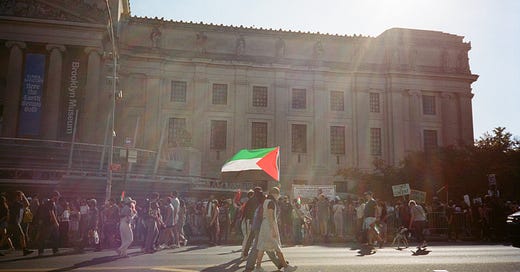The history of the world, long and unending, continually feels like a story of horror and despair. In the past four weeks, over 10,000 people, young and old, were murdered in the Gaza Strip. The harrowing images circulating the internet depict scenes so apocalyptic—bombed babies, leveled neighborhoods, starving survivors—that they almost seem too evil to be true. And yet, unfortunately, they show us nothing but that: an evil truth. Life, which we know to be irreplaceable and precious, has been reduced to a tactic of war. In the name of power, Israel is enacting a genocide of the Palestinian people and openly justifying it with barbaric claims. All the while, American dollars fund the whole thing and have been since the inception of the Israeli settler-colonial state. It is sickening.
Around the world, people are marching across boulevards and bridges, demanding, at the very least, an immediate end to the nonstop bombing—a plea Western politicians like Biden, Obama, Blinken, and even Bernie claim is too lofty and complicated to enact. And though protesting is inherently necessary and good, it has come to feel like an empty gesture towards spineless leaders, democrat and republican alike, who have made their priorities crystal clear: capital over community, power over people. I keep finding myself in waves of anger and sorrow, wondering if my measly voice matters. But luckily, this moment is not about me or my oscillating despair. My feelings have never been less relevant, and thank god for that.
When I wake up weary of the facts, organizers online and off, present and past, remind me to come out of myself and lean into the revolutionary spirit. A spirit that challenges us to reckon with reality, brutal as it may be, and take action. Though it is alluring (and honestly easier!) to be apathetic and conclude that you and I, everyday working-class people, cannot possibly affect the decisions made in governmental meeting rooms, we must reject this temptation and instead think of the liberatory movements that have occurred throughout history. The anti-apartheid movement in South Africa comes to mind, as well as the freedom struggles of Vietnam, Algeria, and Chile, to name a few. These fights—which the U.S. government strongly opposed and, in some cases, even tried to violently shut down—provide a clear example of how possible Palestinian liberation is. They teach us that with proper, ego-dead organization, we can realize the fruit of our struggles. The past shows us this, and so does the present moment. Day by day, we are witnessing how the momentum of demonstrations and social media are prompting people to stand up against Israel’s atrocities. Just this afternoon, 100 congressional staffers staged a walkout and called for a ceasefire. And a few days ago, protesters in Tacoma and Oakland blocked a military ship en route to Israel. Some of these people even hung onto the ship for hours to delay departure. Across the ocean in London, 500,000 people marched through the city in support of Palestine, joining the thousands doing the same across the globe. These actions are just a few of many occurring. And when we consider the burgeoning movement for labor rights across industries, the possibilities for a better world become more tangible by the minute. But I’m getting ahead of myself.
Revolution is ripening; empire is scattering. Let us march, let us urge, let us strike. Let us take action, whatever it may be. Let us free the people; let us free ourselves from the river to the sea.
Further reading
An open letter from Jewish writers, n+1
If Palestinian Freedom Makes You Uneasy, Ask Yourself Why, The New York Times




